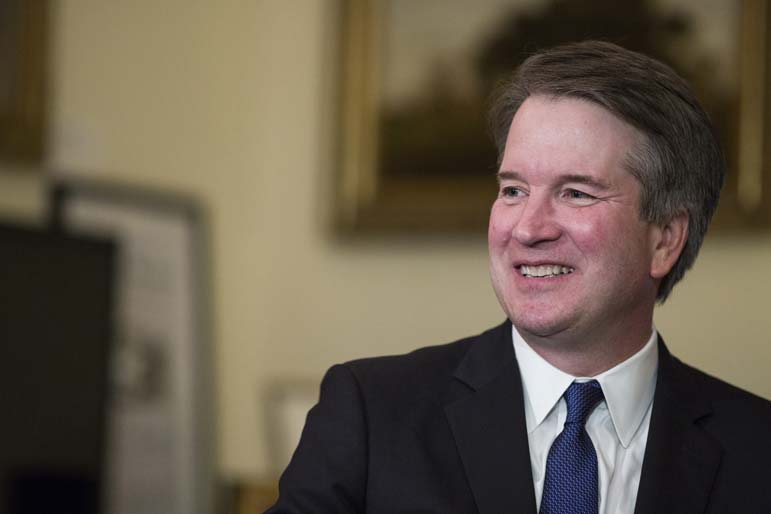 Zach Gibson for Bloomberg
Zach Gibson for Bloomberg
Such a case should not be "difficult," Justice Brett Kavanaugh wrote in a statement joined by Justices Neil Gorsuch and Samuel Alito. Like Kavanaugh, Gorsuch was nominated by Trump.
"Barring religious organizations because they are religious from a general historic preservation grants program is pure discrimination against religion," Kavanaugh wrote.
Nonetheless, the three agreed with the Supreme Court's decision to stay out of a New Jersey case in which the state's highest court said awarding historic preservation grants to churches with active worship programs violated the state constitution.
Kavanaugh said "factual uncertainty" about which kinds of buildings in Morris County, New Jersey, are covered by the preservation program makes this case a poor vehicle for deciding the constitutional issue at stake. But he said the court should be open for taking up a similar case.
Kavanaugh's opinion comes a week after the court listened to arguments about the most high-profile case of its term regarding the separation of church and state: whether the 40-foot Bladensburg Peace Cross on public land in a Maryland town is an unconstitutional government endorsement of religion.
The justices indicated in that argument that they might be looking for a narrow way to leave in place the cross, erected nearly 100 years ago by private families and organizations as a memorial to World War I dead. It was erected on private land now overseen by a government commission.
In the New Jersey case, the Morris County Board of Chosen Freeholders awarded $4.6 million over a three-year period to repair 12 churches as part of a historic preservation program. But the New Jersey Supreme Court said that would violate a 240-year-old provision in the state constitution that bans the use of public funds to build or repair any place of worship.
That court distinguished the program from the Supreme Court's 2017 decision in Trinity Lutheran Church of Columbia v. Comer, which said it was unconstitutional for Missouri to deny a grant for playground resurfacing to a religious school while providing money to similarly situated non-religious schools.
The New Jersey court said: "This case does not involve the expenditure of taxpayer money for non-religious uses, such as the playground resurfacing in Trinity Lutheran. The appeal instead relates to grants that sustain the continued use of active houses of worship for religious services and finance repairs to religious imagery. In our judgment, those grants constitute an impermissible religious use of public funds."
But Kavanaugh said the decision of the New Jersey court "is in serious tension with this court's religious equality precedents."
Those decisions, he said, repeatedly held that "governmental discrimination against religion - in particular, discrimination against religious persons, religious organizations, and religious speech - violates" constitutional protections of the free exercise of religion and equal protection.
The combined cases were Morris County Board of Freeholders v. Freedom From Religion Foundation and the Presbyterian Church in Morristown v. Freedom From Religion Foundation.
Kavanaugh's statement came as the court decided three noncontroversial cases. He wrote one of those opinions, deciding the meaning of a federal statute that allows one side to recover the "full costs" of litigation.
The court unanimously overturned a decision of the U.S. Court of Appeals for the 9th Circuit that allowed expenses not specifically included within the six categories of costs identified in the statute.
Kavanaugh explained how the word "full" operates in the statute.
"A 'full breakfast' means breakfast, not lunch," he wrote. "A 'full season ticket plan' means tickets, not hot dogs. So too, the term 'full costs' means costs, not other expenses."
The case is Rimini Street Inc. v. Oracle USA Inc.
Sign up for the daily JWR update. It's free. Just click here.
(COMMENT, BELOW)


 Contact The Editor
Contact The Editor
 Articles By This Author
Articles By This Author